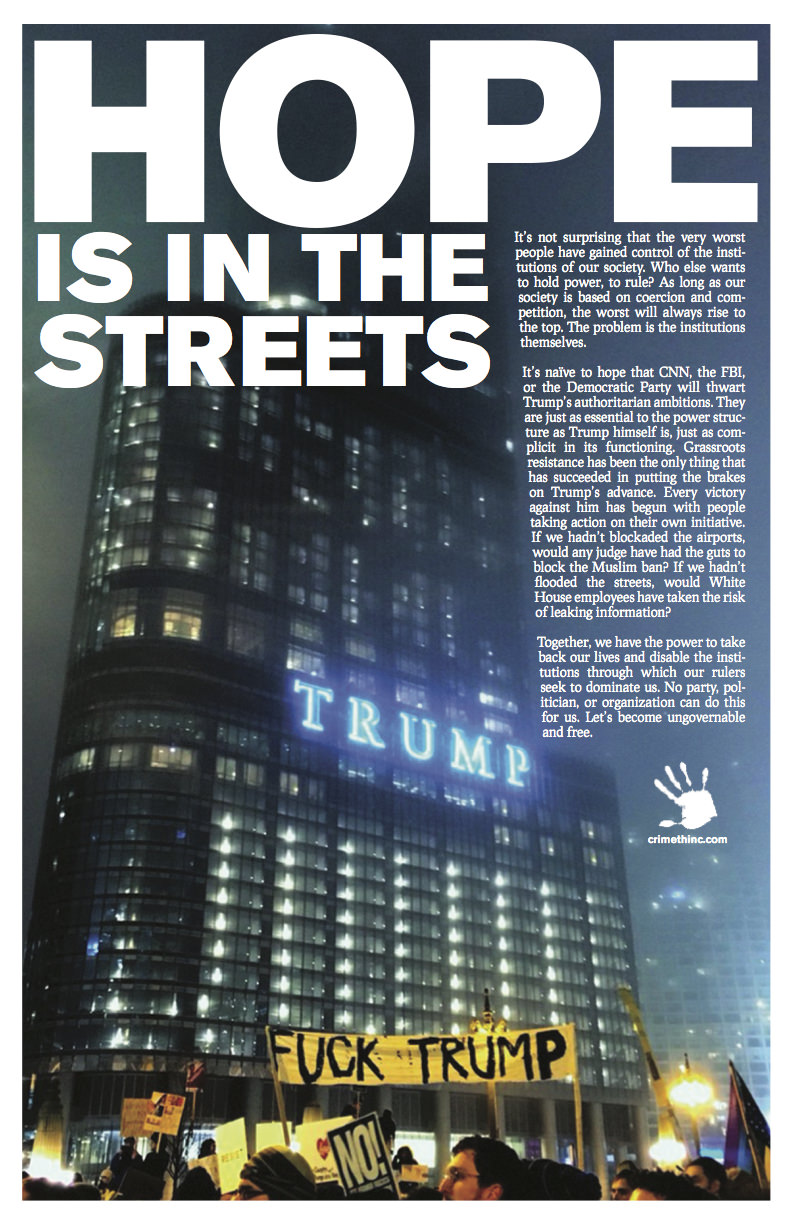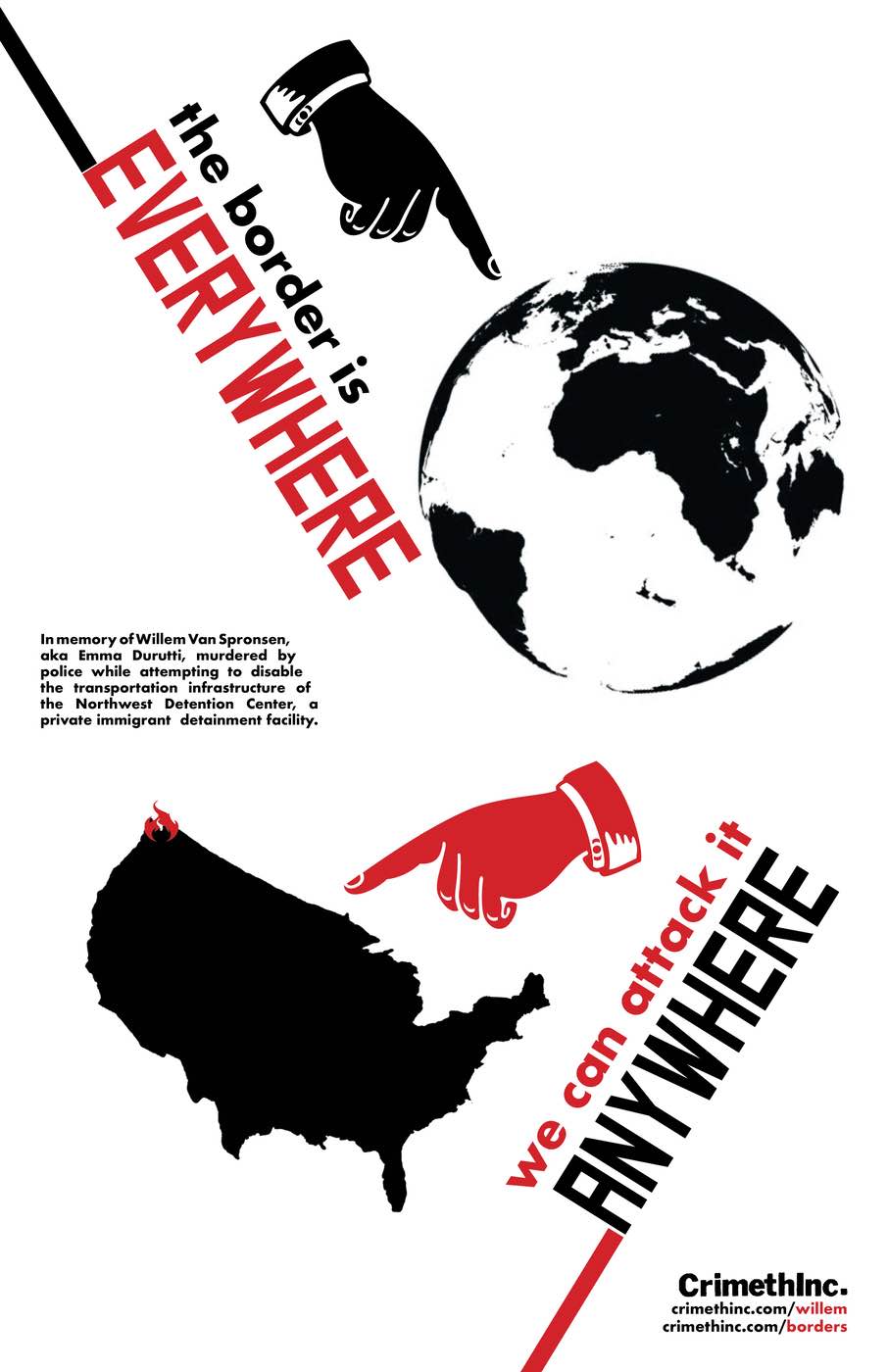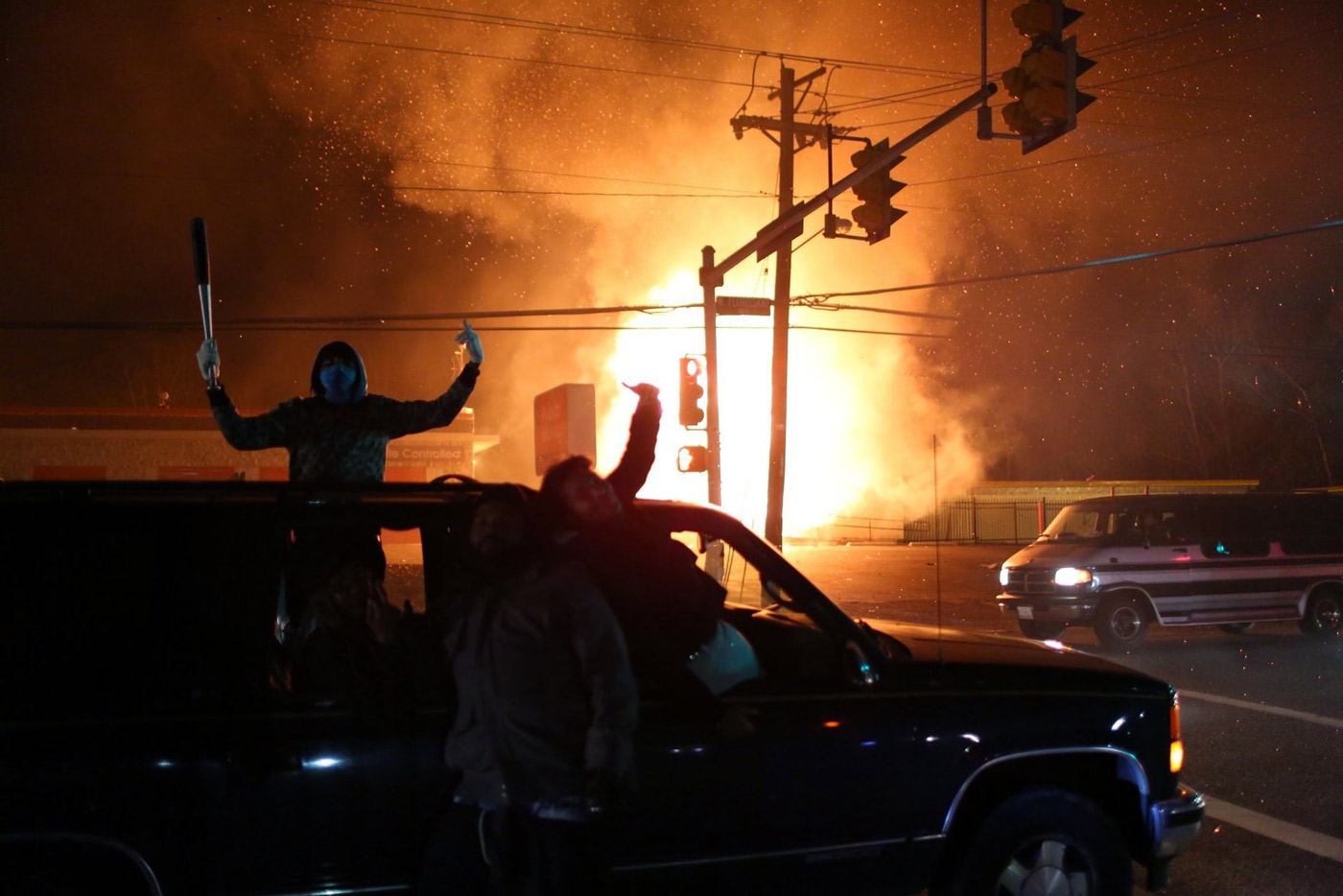
The beginning of a new year offers us an opportunity to look back over our accomplishments and the things we stand to learn from the previous year. In the following report, we will review our efforts throughout 2019, set in the context of world events. This has been a year of stalemate in the US, while elsewhere, a new wave of confrontational movements has inspired some commentators to predict a global revival of anarchism on an unprecedented scale.
While this strikes us as optimistic, it adequately describes the stakes of the situation today. The first decade of the 21st century saw the end of the era of capitalist triumphalism; the second decade saw an explosion of uprisings followed by a wave of repression and reactionary nationalism. The decade ahead of us marks a decisive turning point in the history of our species. Increasingly polarized and nationalistic geopolitics are producing one war after another now. Desperate and oppressed people are rising up—though often without a clear analysis of the causes of their misery—while governments and corporations race to develop technology that can effectively surveil populations and suppress revolt. Meanwhile, industrially driven climate disruption is generating ecological disasters that threaten the biosphere itself.
We will either figure out how to break down the existing mechanisms of control on a massive scale, as people have been doing in Chile over the past several months, or we will enter a period of worldwide tyranny from which humanity may never emerge.
Currently, we are hardly prepared for the struggles this coming decade will bring. Still, it is helpful that some projects and networks persist from the struggles of the previous decades—including this particular project, the CrimethInc. ex-Workers’ Collective. At the bare minimum, we have to pass on the lessons of past struggles, update our analyses and strategies for the current era, and form much more ambitious and wide-reaching networks and initiatives. The price of failing to do this will be unspeakable.
Chilean anarchists and other rebels celebrating New Year’s Eve in Plaza de la Dignidad by driving back the police and honoring the dead.
Everything our collective accomplished in 2019—from writing articles and recording podcasts to programming this site and mailing out book orders—we achieved by means of 100% volunteer labor, working collectively and anonymously the way we have since the mid-1990s. We seek neither financial gain nor personal fame for what we do. We are driven solely by the desire for liberation—liberation for all, in all the different forms it takes.
As others recently put it,
“For our part, we seek to live without masters or bosses, in harmony with nature and animals, in a dignified and responsible manner, respecting each other, understanding that each one has different abilities, but that each is of equal value… [we believe in] self-education, sharing in free association for the pleasure of doing so and not for the need to survive, relying on values such as solidarity, altruism, honesty, and mutual support.”
If you like what we do, the best thing you can do is do it yourself—take action in your own community, develop and refine your own analyses and strategies, reach out to others and mobilize for social change. You can also contribute to our efforts in a variety of ways, or, failing that, donate to us to help us print new outreach materials. Please contact us if you want to help in some other way! Later this week, we’ll publish a more specific request for assistance with our next round of projects.
For further reading in the vein of the following report, you could consult the 2019 overview from Anarchist Agency, a similar report from our Brazilian counterparts, and the reports we published looking back on 2018 and 2017.
A New Year’s Eve dinner in Plaza de la Dignidad bringing together anarchists and other front-line fighters in the Chilean uprising with supporters from the older generation and the hungry and needy. Scenes like this show us how inspiring mutual aid practices can be in the midst of our ongoing struggles.
In the US, an Ongoing Impasse
Over two years later, 2017 remains the high point of struggles against Trump and the repressive agenda his regime represents. For good or for ill, the airport blockades, the deplatforming of Milo Yiannopoulos in Berkeley, and the groundswell of anti-fascism that followed the “Unite the Right” rally in Charlottesville mark the high-water mark of contemporary direct action efforts. This is instructive: the moment of greatest possibility often occurs at the opening of a new era, when the horizon of what can happen has not yet been fixed in the popular imagination. Rather than planning to slowly build momentum, it is sometimes important to seize the window of opportunity and figure out how to build from there.
Conversely, one of the reasons anarchists in the United States are experiencing a relative lull in activity is that, since 2017, we have been compelled to put more energy into mobilizing in response to emergencies than into slowly, steadily cultivating communities that can act together. The subcultures that nourished generations of rebels have largely melted away or been coopted; online networking is a poor substitute for long-term networks based in shared activities.
But we should not hold ourselves solely responsible for the current lull. It takes place in the larger context of massive institutional efforts to substitute the spectator sport of electoral politics for the revolutionary practice of direct action.
As we argued in “Life in ‘Mueller Time’,” the Democratic Party has intentionally introduced a series of spectacles aimed at centralizing itself in the popular imagination as the chief representative of anti-Trump sentiment and the only hope for social change. Foremost of these spectacles are the Mueller investigation, the recent impeachment proceedings, and the ongoing Democratic primaries. Neither the Mueller investigation nor the impeachment have threatened Trump’s power—and the 2020 election may not, either. But all three of them serve to focus attention on institutional processes and invest legitimacy in existing authority figures—including career politicians, judges, and the FBI.

Against those who count on the authorities to resolve the problems caused by those in authority…

…we know it’s up to us to deal with the situation.
In this context of cooption, 2018 saw an impasse emerge in struggles between the nationalists around Trump, the centrists around the Democratic Party, and social movements, in which none of these three forces was able to definitively gain the upper hand. This impasse continued throughout 2019.
We can see the evidence of this impasse in the desperately needed but not yet successful efforts to get a powerful new ecological movement off the ground in the US, despite the spread of Extinction Rebellion overseas; Extinction Rebellion is too legalistic and pacifist for our tastes, but its popularity speaks to a real need for ecological action. We can also see the impasse in the comparatively tame response to the Turkish invasion of Syria, at least outside the Bay Area and a couple other hotspots, and in the limits that solidarity efforts reached mobilizing against the latest wave of state attacks on the undocumented. Unfortunately, one of the more effective efforts in that struggle may have been the action Willem Van Spronsen carried out on the Northwest Detention Center, a private immigration detainment facility. Police killed Van Spronsen in response. But a US Immigration and Customs Enforcement (ICE) official subsequently explained to the media that the dramatic increase in anti-immigrant raids that Trump had called for had not taken place in part because of the fear Van Spronsen’s action had generated among the mercenaries serving ICE.
We do not believe in canonizing people as heroes. Likewise, we strongly urge against people intentionally sacrificing their lives. If anti-border movements had found more effective collective means of action against ICE operations, maybe Van Spronsen would still be alive—and some of the millions of people who have been deported from the United States would still be at liberty. We honor the long-running efforts to support undocumented people that our comrades have maintained in the face of repression. The question of how to build on them remains a challenge for all of us.

Click the image to download the PDF.
Escalating Conflicts
Meanwhile, outside the United States, from France and Hong Kong to Sudan and Haiti, protracted struggles were playing out between governments and powerful social movements. This ferment reached as far as Puerto Rico, a United States territory, though denied equal status to the states proper.
In October, conflict came to a boil on many fronts at once. Trump had been threatening to let Turkish President Tayyip Erdoğan invade Rojava since December 2018; at the beginning of October, he finally did exactly that, giving Turkey carte blanche to slaughter and displace hundreds of thousands of people on the Syrian side of the border.
We scrambled to respond, publishing a call for solidarity actions against the Turkish invasion that was endorsed by well over 100 organizations, alongside a series of articles on the situation, including “Why the Turkish Invasion Matters” and “The ‘Ceasefire’ Is a Deadly Fraud,” debunking Vice President Mike Pence’s lie that he had brokered a ceasefire in the region.
At the same time, the wave of uprisings that had begun with Haiti, Hong Kong, and Sudan spread to Ecuador, Chile, Honduras, Catalunya, Lebanon, Iraq, and elsewhere. As our networks extend throughout many parts of the world, we went to great lengths to present on-the-ground reporting and analysis from many of these upheavals.

Street fighters holding back the police during clashes in Catalunya, October 2019.
International Coverage
In 2019, we published firsthand reports on struggles around the world, from Lebanon to Sudan. Here are some of the highlights.
Hong Kong
Corresponding with anarchist participants in the powerful social movement against the Chinese-backed government of Hong Kong, we were fortunate to publish two of the most influential texts expressing the perspectives of anti-authoritarians within the movement, “Anarchists in the Resistance to the Extradition Bill” and “Three Months of Insurrection.” We recommend these two interviews as some of our best and most thought-provoking work in 2019.

Three Months of Insurrection: An Anarchist Collective in Hong Kong Appraises the Achievements and Limits of the Revolt.
Greece
This year, Greece saw the inevitable end of the disappointing left government of Syriza, which was replaced by the aptly-named far-right New Democracy party. New Democracy immediately declared an all-out war against refugees, anarchists, squatters, students, and the world-famous Athenian neighborhood of Exarchia. In response, we worked with comrades in Athens to chronicle resistance and repression from one month to the next:
Earlier in 2019, we also published “Putting Ideas on Trial: The Greek State’s Laboratory of Repression,” an interview with Greek anarchist prisoner Nikos Romanos.
Ecuador and Chile
In Ecuador, a state austerity package prompted an uprising that nearly overthrew the government. We interviewed a participant immediately before the government caved in and canceled the package, while barricades still stood in the streets of the nation’s capital: “Inside the Quito Commune.”
The uprising in Ecuador helped to inspire a similar uprising in Chile, which continues to this day. We published two articles charting its first days, “Chile: Resisting under Martial Law” and “On the Front Lines in Chile: Six Accounts from the Uprising.” Since then, we have continued to publish updates and interviews from the streets of Chile via our podcast.

Altered billboards in Chile: “Looting is how a university student has to pay over twenty years what a congressman makes in two months.”—”Violence is when the police burst into a high school and shoot at the students.”—”The destruction of something man-made is called ‘vandalism,’ while the destruction of nature is called ‘progress.’” From our text, “Not Falling for It: How the Uprising in Chile Has Outlasted State Repression.”
Catalunya
Following our critical coverage of the independence movement in Catalunya two years ago, we published a report on the clashes that broke out in Catalunya in October 2019. We followed it up shortly afterwards with a first-person account from the front lines of the fighting, one of the most exciting texts we published this past year.
France
Throughout the first half of 2019, we continued to publish reports from the Yellow Vest movement in France as it slowly wound down and transitioned into other movements. Continuing the analysis we began in From Democracy to Freedom, our most important text about the Gilets Jaunes in 2019 was probably “Between the Reaction and the Referendum,” a look at nationalism and “direct democracy” in the Yellow Vest movement.
At the same time, a year after the state raids and evictions at la ZAD—the Zone à Défendre (Zone to Defend) at Notre-Dame-des-Landes in western France, where occupiers had successfully blocked an unwanted airport—we published “Reflections on the ZAD: Another History.” While some activists steer away from dealing with the complex internal dynamics of inspiring projects like the ZAD, we feel that in the pursuit of liberation, it is just as important to learn from internal struggles as it is to learn from conflicts with the authorities; failing to do so will doom us to repeat the same mistakes.

La ZAD in France.
Doing What We Do Best
Like many other anarchists, we spent much of 2019 scrambling to react to emergencies rather than making progress on our own beloved projects. Especially in October and November, we put everything else on hold. One of our longer-term goals is to expand our capacity to such a point that we can continue to make progress towards our long-term projects while responding to current events.
Unexpectedly, one of our most widely read texts of 2019 was “Against the Logic of the Guillotine,” a critique of fantasies about using the institutions of the state to exact revenge. The popularity of articles like this suggests that we should be putting more energy into reflective and theoretical writing.
We also reached many readers with “Storming the Gates,” an analysis of the importance of uncompromising anti-carceral movements, and “The Wrong ICE is Melting, The Wrong Amazon is Burning,” emphasizing the importance of direct action to ecological movements. We followed up the latter article with “What Is Burning the Amazon?”, a perspective from Brazil.
In 2020, we aspire to step back from the constant commotion of events to publish more reflective texts like these.

Storming the Gates: The New Wave of Frontal Attacks on Prisons, Jails, and Detention Centers.
Mobilization
By and large, participants in CrimethInc. projects do most of our direct action organizing in other venues. However, we do occasionally coordinate mobilizations, such as our decade-running annual day of action, Steal Something from Work Day.
In February 2019, facing another potential government shutdown over funding for Trump’s xenophobic border wall, we announced a call to action under the watchword “Block the Wall.” This campaign brought together a network of anti-border activists, giving rise to a variety of small outreach actions and longer-running solidarity efforts including a freestanding website.
As mentioned above, our most significant mobilizing effort was our call to action against the Turkish invasion of Syria, which was endorsed by everyone from the Democratic Socialists of America and Cooperation Jackson to Noam Chomsky, David Graeber, and Debbie Bookchin.
Finally, at the end of the year, we announced a call for a day of action against the rising cost of living on November 29, 2019 under the banner #NobodyPays. This was inspired by the fare-dodging protests that had helped to catalyze the uprising in Chile. The call also appeared in Spanish, French, Portuguese, Swedish, and Finnish.
In the United States, following two major demonstrations in New York City against police violence on public transit, #NobodyPays actions took place in Seattle, Portland, San Francisco, Chicago, Minneapolis, Toronto, and elsewhere, as chronicled here. Although the actions did not trigger a countrywide upheaval, like the evasión masiva actions in Chile, nor give rise to a fare-dodgers’ union, like planka.nu in Sweden, they did put the tactic of fare-dodging in the public consciousness as a means of taking collective direct action to counter austerity measures.
https://twitter.com/IGD_News/status/1200962321251733504
History
As we emphasized above, one of our missions is to pass on the experiences and lessons from recent anarchist efforts. Tomorrow’s rebels will be better equipped to act effectively if they are informed about the movements of the past several decades as well as classical reference points like the Paris Commune.
At the beginning of 2019, two years after the #J20 demonstrations at Trump’s inauguration, we published a series of articles appraising the mobilization and the legal case that followed it. This included “Anarchist Resistance to the Trump Inauguration,” a minute-by-minute analysis of the events of January 20, 2017 in Washington, DC; “I Was a J20 Street Medic and Defendant,” a narrative from one of the first defendants to go to trial in the subsequent conspiracy case; and “We’ve Got Your Back: The Story of the J20 Defense,” a full retrospective on the solidarity and legal support strategies that ultimately resulted in the dropping of charges against the vast majority of J20 defendants.

Anarchist Resistance to the Trump Inauguration: Understanding the Events of January 20, 2017.
We published two other lengthy accounts of anarchist participation in 21st-century upheavals: “Looting Back,” chronicling the uprising that took place in Ferguson, Missouri in 2014 in response to the police murder of Michael Brown, and “The Battle for Ungdomshuset,” recounting the history of Denmark’s most combative social center.
Following the Turkish invasion of Syria, we published “The Roots of Turkish Fascism,” charting the rise of fascism in Turkey across a century in order to explain the context of Erdoğan’s assault. For lighter reading, we observed Valentine’s Day with “Love, Anarchy, and Drama,” exploring several classical anarchists’ experiments with non-monogamy.
Finally, continuing our series on the Russian Counterrevolution that we began on the 100-year anniversary of the seizure of the Winter Palace in 1917, we published “When the Bolsheviks Turned on the Workers,” a retrospective on the Putilov and Astrakhan strikes of 1919.

Looting Back: An Account of the Ferguson Uprising.
Podcasts
In 2019, we published a full audiobook version of our book No Wall They Can Build: A Guide to Borders and Migration across North America. We hope this can set a precedent for us to release audiobook versions of future books, as well.
The podcast crew also mobilized to respond to the Turkish invasion of Syria, releasing a four-episode series within only ten days. Then they did the same thing in response to the uprising in Chile, releasing three fully bilingual episodes from on the ground at the center of the uprising, with a fourth episode to be released shortly.

Going Multi-Lingual
At long last, we are poised to make this site fully functional in a wide range of languages in addition to English. Already, we have es.crimethinc.com and de.crimethinc.com functioning for those who access the site from Spanish-speaking and German-speaking parts of the world; already, you can peruse crimethinc.com/languages to find a list of the articles we have available in each of ten different tongues.
A considerable number of posters, zines, and book pdfs are also available on this site now in Spanish, French, Portuguese, German, and other languages, and we hope to add a lot more soon. In 2019, we also added a Japanese version of our anarchist primer To Change Everything to the site, bringing the total number of language options for that project to 32. Currently, it is our most translated project; soon, we hope to make much more of our material available multilingually.
If you can help us translate texts, or simply collect and proofread existing translations, please contact us.
Archives
One of our responsibilities in maintaining this site is to keep 25 years worth of CrimethInc. texts and projects accessible to new generations. In 2019, we added a journals page to our archive, including all the issues of our magazine Rolling Thunder, and also added scans of a much older journal we started publishing in the 1990s, the hardcore zine Inside Front.
We also reprinted two of our classic books, Work (2011) and Expect Resistance (2007).

Ludic Pursuits: Arts and Games
We didn’t do as much with the arts in 2019 as we hope to in 2020. Our most widely circulated creative work was probably “Police: An Ethnography,” a photoessay exploring the common threads that tie together police psychology all around the world. In the art-for-art’s-sake category, for Valentine’s Day we published two works of pure fiction, “Injury against Erasure/Damage against Time.”
We also published two games this year—our acclaimed J20 Protest Simulator, a choose-your-own-adventure game enabling the player to participate in the black bloc that interrupted the spectacle of Trump’s inauguration, and Up against the Wall, Motherfucker, a simulation of the 1968 occupation of Columbia University.

Click here to play our J20 Protest Simulator.
Outreach
Throughout 2019, CrimethInc. agents distributed literature at events across the United States, including the Asheville Anarchist Book Fair, the Olympia Zine Fest, the Boston Anarchist Book Fair, the New York City Anarchist Book Fair, the East Bay Alternative Book and Zine fest in Oakland, the Howard Zinn Book Fair in San Francisco, and the Humboldt County Anarchist Book Fair, among others.
CrimethInc. agents also conducted tours of the southern half of Brazil between June and July and the West Coast of the United States in December, promoting the English and Portuguese versions of the book From Democracy to Freedom and speaking about various forms of contemporary anarchist struggle. The report from the tour in Brazil includes an overview of anarchist projects and popular struggles throughout the country.
This report only covers a fraction of what we did in 2019. We have a lot planned for 2020, but as usual, it’s better not to promise things—but simply to do them. We’ll see you on the front lines this year.

Celebrants in the Plaza de la Dignidad on New Year’s Eve, 2019: “Only by fighting do we advance.”








